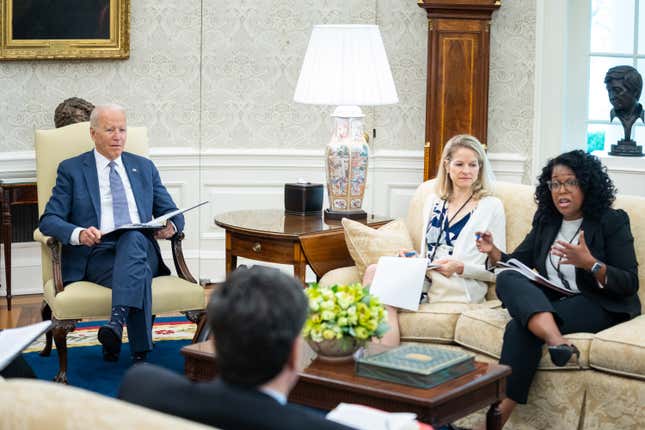
Over a career spanning a partnership in Big Law to the Obama Justice Department, there wasn’t much that left Deputy Counsel to the President Danielle Conley unprepared for her current role as one of the top Black women lawyers in the federal government. Conley leads a team of White House attorneys that, among other things, was instrumental in making sure a historic package of executive orders designed to address systemic racism throughout the government could pass Constitutional muster. But the most rewarding part of her gig was captured in a candid picture of her crying instead of celebrating. She sat down with The Root to tell us why.
This interview was edited for length and clarity.
The Root: Your job is pretty important but most people don’t know who you are or what you do.
Danielle Conley: So, the Counsel’s office is like a mini law firm inside the White House. I lead the racial justice and equity team and this is the first time this team has actually existed in the White House. We help make sure the initiatives that the President and the agencies roll out are on the right side of the law.
TR: Give us an example of how your work shows up in policy.
DC: Just a couple of weeks ago, the president announced 75 sentence commutations and three full pardons. The president has been saying that he feels strongly there are people who are serving sentences that are way too long, especially for nonviolent drug offenses. It’s something I’m particularly proud of because my team led those efforts.
TR: How hard is evaluating who deserves to come home and who doesn’t, outside of just looking at the legal parameters for getting a commutation or pardon?
DC: I think the president really focused on people who, while they were incarcerated, did things like further their education or sought out opportunities to do job training. Many of the people who were granted commutations were already serving home confinement successfully. They have integrated back into their communities, they were employed, they were reuniting with their families.
TR: In April, the President rolled out racial equity plans for every agency in the federal government. How concerned are you that that work will survive if Congress changes hands or when administrations eventually change?
DC: I’m naturally a person who worries—I think that’s what makes me a good lawyer, frankly—so the answer is probably yes. But I think the goal of this administration was to focus on what we could do now in order to initiate long-standing change, understanding that those things are done by executive order.
We know that things that aren’t passed by Congress for the most part can be chipped away at and undone in subsequent administrations but I do think that some of the changes the agencies have been focused on are going to make differences to generations.
TR: What was your role in helping Judge Ketanji Brown Jackson be confirmed to the Supreme Court?
DC: Our office runs point on judicial nominations, so we worked with Sen. Jones [former Sen. Doug Jones served as the “sherpa” for Jackson’s confirmation] and others across the West Wing on every aspect of the confirmation process. One of the things I’m most proud of is that there were Black women in the room every step of the way, because it showed that we truly do belong and add value in every single space.
TR: There’s a photo of you sitting behind Judge Jackson during the confirmation hearings, crying. Why?
DC: I didn’t think I’d ever see a Black woman Supreme Court justice in my lifetime. And I have daughters who are eight and 11 who were watching all the hearings, and watching me be pretty absent for the past year and a half as I’ve done this work. But I think the inspiration that I gave them, to know that they truly believe in their hearts that they can be just like her, that the sky really is the limit, all of that came out in that moment. That’s what you saw in that picture.
About Danielle Conley
Age: 44
Hometown: Sugar Land, Tx.
Education: Tulane University - B.A., English and African Diaspora Studies;
Howard University School of Law - Juris Doctor
Family: Aaron Stallworth (husband); Harper & Marley (daughters)

